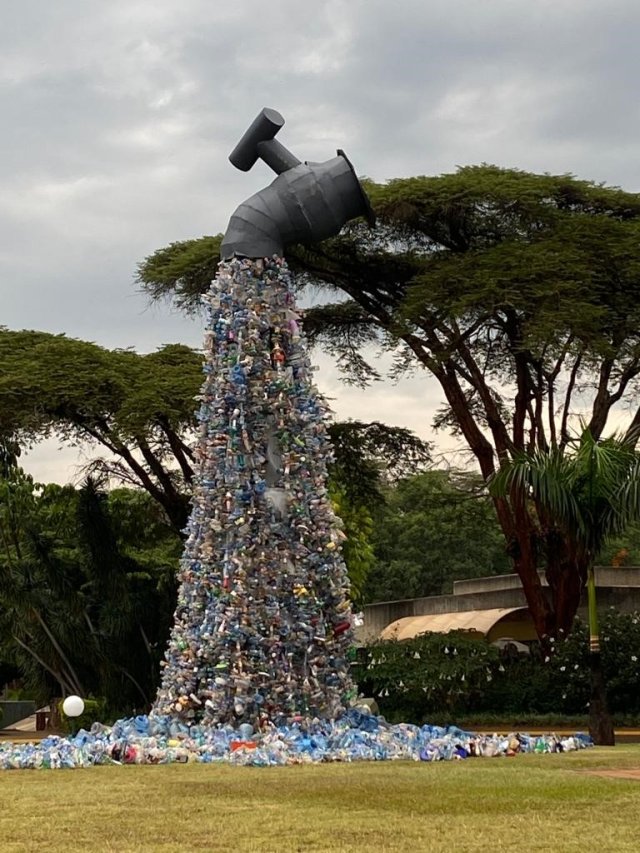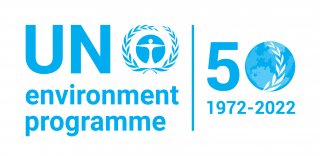EPA's Role in the United Nations Environment Programme (UNEP)
The United Nations Environment Programme (UNEP), established in 1972, addresses environmental issues at the global and regional level for the United Nations. UNEP’s mission is “to provide leadership and encourage partnership in caring for the environment by inspiring, informing, and enabling nations and peoples to improve their quality of life without compromising that of future generations.”
To accomplish its mission, UNEP:
- assesses environmental conditions and trends at the global, regional and national levels;
- develops international agreements and national environmental instruments; and
- strengthens institutions for wise environmental management.
UNEP is governed by the United Nations Environment Assembly (UNEA), a council with universal membership that sets the UNEP agenda.
Highlights
The Fifth United Nations Environment Assembly (UNEA-5.1 and UNEA-5.2)

March 2022: The theme for the Fifth United Nations Environment Assembly (UNEA-5) was “Strengthening Actions for Nature to Achieve the Sustainable Development Goals.”
Due to the COVID pandemic, the conference was divided into two sessions. In February 2021, delegations from around the world gathered virtually for the first session, UNEA-5.1, which focused on a streamlined agenda of urgent and procedural decisions. Member states passed UNEP’s medium-term strategy for 2022-2025 and a program of work and budget for 2022-2023. Substantive matters that required in-depth negotiations were deferred to a second, in-person session, UNEA-5.2, which took place in Nairobi, Kenya, February 28-March 2.
EPA played a leadership role as an integral part of the U.S. interagency team to UNEA-5, culminating in the adoption of 14 resolutions and other key outcomes, including a landmark agreement to launch an Intergovernmental Negotiating Committee (INC) to develop a legally binding instrument on plastic pollution, including in the marine environment, to be negotiated by the end of 2024. This and other UNEA 5.2 resolutions can be found on the UNEP website.
Other resolutions adopted at UNEA-5.2 included:
- environmental aspects of mineral and metals management
- sustainable lake management
- sustainable and resilient infrastructure
- nature-based solutions for supporting sustainable development
- sound management of chemicals and waste
- enhancing circular economy
Member states also agreed to the dates for the Sixth United Nations Environment Assembly (UNEA-6), which is scheduled for February 26th – March 1st, 2024.
U.S. EPA and UNEP Partner to Protect Human Health and the Environment
September 2021: Former EPA Administrator Regan and the UNEP Executive Director Inger Andersen held a virtual ceremony and signed a Memorandum of Understanding (MOU) renewing cooperation between EPA and UNEP. The agreement addresses key areas of collaboration to strengthen environmental governance, create healthy communities, transition towards green economies, and respond to climate change and other global environmental challenges. The organizations have also committed to lead by using science as the basis to tackle environmental pollution and rising emissions to ensure healthy and productive ecosystems and people. The first EPA-UNEP MOU was signed during the 26th Session of the UNEP Governing Council Meeting/Global Ministerial Environment Forum, in Nairobi, Kenya in 2011 and the second was signed in 2016. The EPA-UNEP cooperative agreement established under this current MOU will remain in force until September 30, 2026.
About UNEP

In the past, UNEP was administered by a 58-member Governing Council, but at the Rio+20 UN Conference on Sustainable Development in 2012, “universal membership” was established for UNEP, to include the full 193 member states of the UN. This change also replaced UNEP’s Governing Council with the UN Environmental Assembly (UNEA) of UNEP, composed of the full 193 UN members.
UNEA acts as a parliament of the environment and sets UNEP’s agenda. The first meeting of UNEA (UNEA-1) took place in June 2014. UNEA-2 was held in May 2016, UNEA-3 in December 2017, and UNEA-4 in March 2019. The fifth meeting of UNEA began with an initial, virtual session (UNEA 5.1) in February 2021 and continued its second session, UNEA 5.2 in February 2022. UNEA-6 was held in February 2024 and UNEA-7 in December 2025. Visit the UNEA-6 website to learn more.
UNEP also hosts the secretariats of several programs and conventions, including:
- Bali Strategic Plan for Technology Support and Capacity Building (BSP)
- Basel Convention on the Control of Transboundary Movements of Hazardous Wastes
- Convention on Biological Diversity
- Convention on International Trade in Endangered Species of Wild Fauna and Flora (CITES)
- Convention of Migratory Species of Wild Animals
- Global Adaptation Network
- Global Alliance to Eliminate Lead Paint
- Global Programme of Action (GPA) for the Protection of the Marine Environment from Land-based Activities
- Minamata Convention on Mercury
- Montreal Protocol on Substances that Deplete the Ozone Layer and its Multilateral Fund
- Partnership for Clean Fuels and Vehicles
- Rotterdam Convention on Prior Informed Consent Procedure for Certain Hazardous Chemicals and Pesticides in International Trade
- Stockholm Convention on Persistent Organic Pollutants
- UNEP Regional Seas Programme
UNEP has regional offices for Africa, Asia and the Pacific, Europe, Latin America and the Caribbean, North America, and West Asia. The current Executive Director of UNEP, Inger Andersen, was appointed by the UN General Assembly in 2019 and re-elected in 2023 for another four year term.
EPA @ UNEP
EPA has had a long and successful relationship with UNEP, including numerous substantive partnerships to strengthen global efforts to protect human health and the environment. The 2011, 2016 and 2021 (PDFs) MOUs between EPA and UNEP solidified this relationship and have deepened our engagement on a range of issues, including:
Chemicals and Waste
EPA has led the U.S. government participation in the Global Mercury Partnership and strongly supported the Global Mercury Assessment that influenced the development of the Minamata Convention on mercury.
EPA is a member of leadership role as current chair of the Global Alliance to Eliminate Lead Paint, which is working to have all countries enact laws to eliminate lead in paint by 2020.
Air Quality and Climate
EPA played a leadership role in the development and passage of the UNEA-6 Resolution Promoting Regional Cooperation on Air Pollution to Improve Air Quality Globally. The resolution encourages Member States to accelerate efforts to address air quality including by developing natioanl air quality programs and asks UNEP to facilitate further cooperation on air quality.
EPA was instrumental in establishing and continues to play a leadership role in the Partnership for Clean Fuels and Vehicles. This partnership achieved the universal elimination of lead in gasoline worldwide and is working to eliminate sulfur from fuels. To complement the work on clean fuels, the PCFV has also launched a used vehicles working group including representatives from governments, the auto industry, and related nonprofit organizations. Despite improvements in fuel quality, obsolete and outdated vehicle technologies continue to be transferred to developing markets through the global used vehicle market, as documented in UNEP's Global Trade in Used Vehicles Report. While used vehicles provide a more affordable opportunity to increase personal mobility, older vehicles can emit a disproportionate level of pollutants. By addressing used vehicles, the PCFV aims to promote a cleaner vehicle fleet with lower emissions.
EPA has also worked with UNEP and other relevant international organizations to promote air quality monitoring, a first step countries and cities can take towards confronting air pollution challenges and minimizing transboundary air pollution. EPA has contributed its expertise in air quality monitoring, management and regulation to support UNEP in providing developing countries with technical assistance. This work is part of the air quality mandate agreed to by the United Nations Environment Assembly.
Marine and Water

EPA also works on the UNEP Regional Seas Programme , launched in 1974, which addresses the accelerating degradation of the world’s ocean and coastal areas, by engaging neighboring countries in comprehensive and specific actions to protect their shared marine environment. EPA is the designated United States “Technical Focal Point” for the Land-Based Sources (LBS) Protocol under the Cartagena Convention.
EPA coordinates closely with 27 other countries in the Wider Caribbean Region, working through UNEP's Caribbean Environment Program (CEP), which was launched in 1976. The Cartagena Convention, negotiated in 1983, includes three protocols adopted to address specific pollution or environmental resources:
- Combating Oil Spills
- Specially Protected Areas and Wildlife (SPAW Protocol)
- Pollution from Land-Based Sources (LBS Protocol)
The work of the CEP today focuses on serving member states and increasing implementation of these environmentally protective protocols, information management and exchange, and environmental education and training. EPA staff provide expert advice on management of land-based sources of pollution to both protect human health and coastal and marine resources.
One Planet Network
EPA has worked with the US National Focal Point for the One Planet network, which implements the 10-Year Framework of Programmes on Sustainable Consumption and Production Patterns (10YFP), coordinating closely with UNEP through its North America regional office. EPA has supported the development of a Global Sustainable Consumption and Production Clearinghouse, a one-stop hub dedicated to knowledge sharing, cooperation and innovation. EPA participated in several other One Planet network activities, including international cooperation on:
- Sustainable Public Procurement: EPA played a key role in launching this UNEP-led initiative at Rio+20 and serves on the Multi-Stakeholder Advisory Committee and several of the program's Working Groups.
- Life Cycle Assessment: As part of the One Planet network Consumer Information Programme, EPA has worked closely with UNEP to provide technical expertise on lifecycle assessment methodologies in use in the U.S.
- As part of the 13th International Conference on the Life Cycle Assessment of Food, which was held in Lima, Peru on October 11, 2022, EPA and the UN Environment Programme (UNEP) co-launched a report entitled “Single-use supermarket food packaging and its alternatives: Recommendations from Life Cycle Assessments.”
- Food waste: EPA drafted and played a key role in the adoption of a UNEA-2 and UNEA-4 resolutions on the prevention, reduction and reuse of food waste, and worked with the UN Regional Office for North America on the report Waste Not, Want Not: Reducing Food Loss and Waste in North America Through Life Cycle-Based Approaches which examines the issue of food loss and waste through the lens of the life cycle based approach. EPA continues to collaborate with UNEP and support pilot initiatives to promote the recovery of food waste and food recycling consistent with the United States 2030 Food Loss and Waste Reduction Goal, including recent efforts to support the development of public-private partnership models in Brazil and Colombia Learn more about EPA's International Efforts on Wasted Food Recovery.
Contacts
For additional information on EPA's Role in the United Nations Environment Programme (UNEP), contact:
Office of International Affairs
U.S. Environmental Protection Agency
Office of International and Tribal Affairs (2610T)
1200 Pennsylvania Ave., NW
Washington, DC 20460
E-mail: oita.contactus@epa.gov
(202) 564-6600
